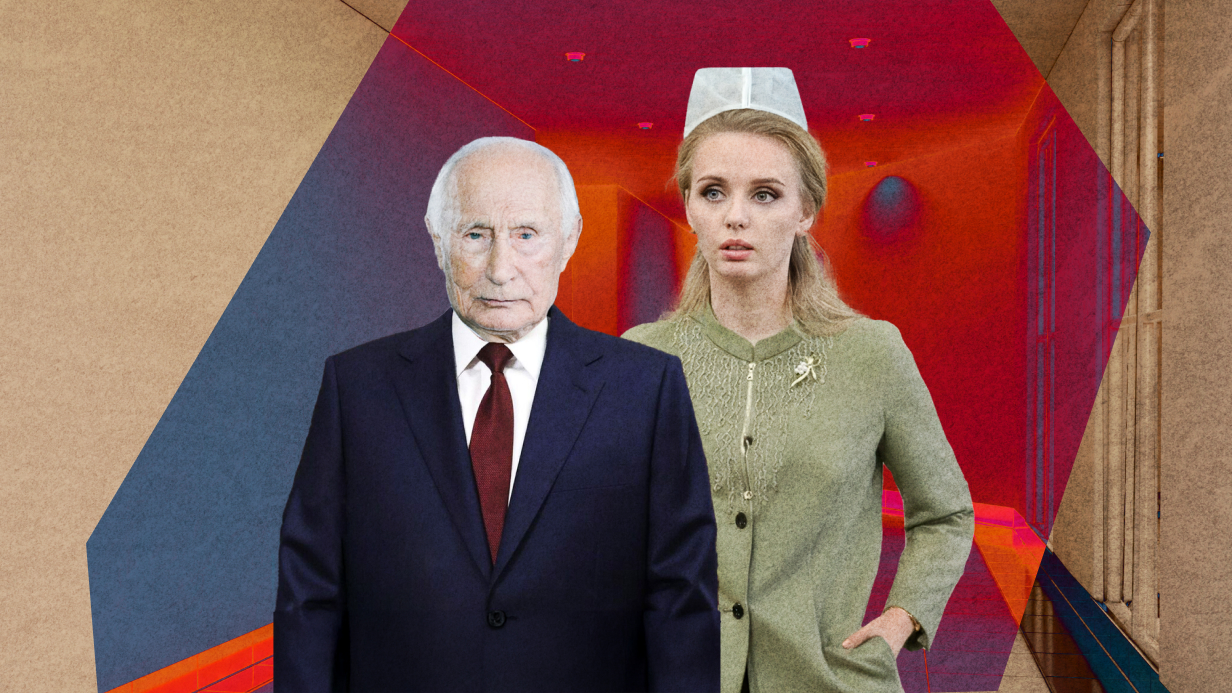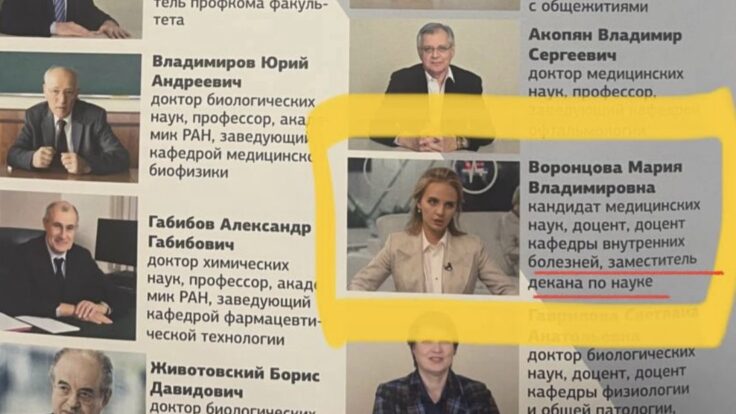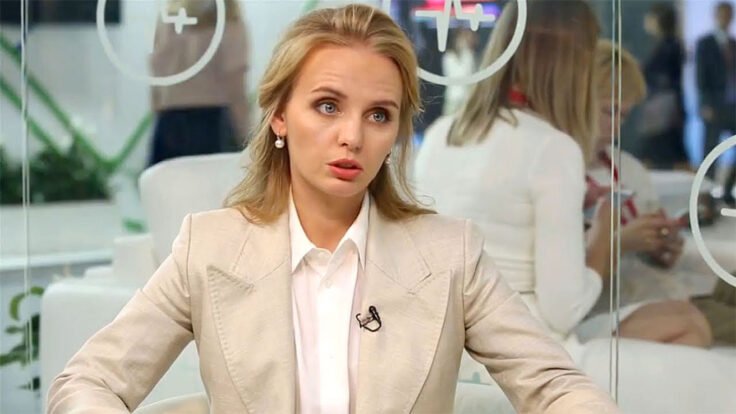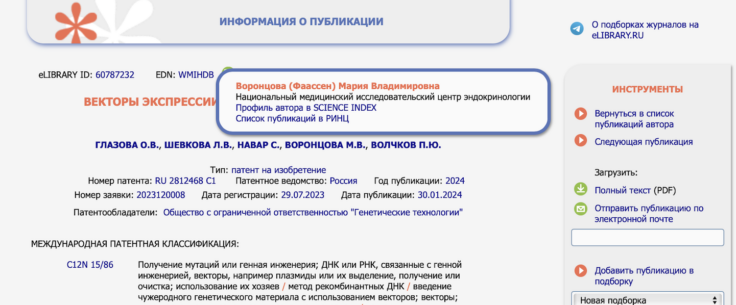
Vladimir Putin’s eldest daughter is now publicly positioned as a major scientist with a “world-class laboratory” without any hint of the need to have appropriate scientific metrics. Her Hirsch index is extremely low, which has not prevented her from winning a major grant from Russia’s main science foundation, on par with the country’s most successful scientists. Immediately before gaining public status as an influential academic leader, Maria Vorontsova had already become a major investor in the medical business and curator of the state program of genetic research. Now Putin’s daughters supervise several flagship areas of state administration – both in the field of medicine and genetics, and in the field of artificial intelligence and high technology.
Maria Vorontsova won a grant from the Russian Science Foundation (RSF) under the program for funding world-class scientific laboratories. The project is called “Regulation of cell renewal processes in the body, the fundamental basis for long-term preservation of functional activity of organs and tissues, human health and active longevity”. The size of the grant is about 30 million rubles. It is assumed that the scientific group will also attract co-financing.
“In order to participate in this competition, one must present a paper on co-financing by an interested organization and prove that the project is useful for the national economy. Sometimes they announce really useful projects, and sometimes they pull the owl over the globe,” says one of the regular RSF grantees, who also participated in the evaluation of RSF grant applications, on condition of anonymity.
T-invariant analyzed the scientometric profiles of 26 winners of the 2025 RSF grant competition. It turned out that most of the scientists are leaders in their scientific fields, with their Hirsch index ranging from 30 to 60.
“Academician Alexander Gabibov and Dr. Ilya Yampolsky from the Institute of Bioorganic Chemistry of the Russian Academy of Sciences, corresponding member of the Russian Academy of Sciences Dmitry Chudakov from Pirogov Russian National Research Institute of Medical Sciences and many others on this list are the first echelon,” explains to T-invariant one of the former department heads of a major metropolitan university who is familiar with many of the grant winners.
The Russian database elibrary.ru determines that Maria Vorontsova (Faassen) has a Hirsch index of 5 (according to the RINC core). This is an important indicator if one considers that this was a competition among really world-class laboratories.

Often in RSF competitions, the project manager acts as a “wedding general”: large grants are given under the names of famous scientists and academic leaders (see the most factual example of the grant won by MSU Rector Viktor Sadovnichy). “But the victory of this application is quite surprising: Maria Vorontsova doesn’t need proxies, her group would have been given to any of her colleagues with higher scientometric indices but a less telling surname,” the T-invariant interlocutor reflects.
“It is not very clear why Vorontsova needs such pennies, about 30 million rubles. Obviously, any money will be found for her aging work. Probably, she is like a wedding general: the application was written by her colleagues in the faculty, and for her it is important from the point of view of academic status,” suggested in a conversation with T-invariant one of the regular grantees of the Russian National Foundation, believing that in this way Maria Vorontsova is raised in formal importance in the scientific hierarchy of the country.
Academic legalization
There is little information about Maria Vorontsova not only in international scientific databases. The amount of information about her has recently changed qualitatively and quantitatively in official Russian sources as well. Putin’s eldest daughter is a candidate of medical sciences, associate professor at the Department of Internal Medicine of the Faculty of Fundamental Medicine at Moscow State University, deputy dean for scientific work of this faculty and a member of the Academic Council of Moscow State University. At the moment, this information can be easily found on the MSU website, although it was not available in open sources as early as December 2022, and Navalny’s team dedicated a separate video to publicizing this data.

Maria Vorontsova was placed on the sanctions lists of the European Union, the United States, the United Kingdom, Canada, Australia and Japan in the spring of 2022. “Vorontsova directs state-funded programs that have received billions of dollars from the Kremlin for genetic research and are personally overseen by Putin,” the U.S. Treasury Department said in comments on the sanctions list.
What is known about Maria Vorontsova’s path in science and business
In 2017, she defended her dissertation on “Treatment of children with pituitary nanism with growth hormone preparations: medical and economic aspects” (pituitary nanism or dwarfism – delayed physical development caused by a lack of growth hormone in the body).
Vorontsova is co-owner of the company Nomeko, which was involved in the realization of the largest private investment project in Russian healthcare – a multifunctional medical complex. In 2019, the BBC Russian Service reported that the project was backed by big business and officials, and the cost was estimated at 40 billion rubles.
Then Nomeko made a major deal – it bought SOGAZ Clinics (known, among other things, for treating PMC Wagner mercenaries there for free). By January 2024, Vorontsova’s income for three years of ownership of the company could amount to almost a billion rubles in the form of dividends and salaries (this is stated in the investigation of Alexei Navalny’s associates).

Personal life of Maria Vorontsova
Earlier, the media also wrote that Vorontsova’s ex-husband is a businessman from the Netherlands Jorrit Joost Faassen. In April 2006, he came to Russia, and in 2007 he was appointed Director of Business Development at Gazprom. By that time he was already acquainted with Maria, The New Times claimed, but it is not known when she married Faassen. Vorontsova signed her scientific publications with her husband’s surname or double surname.

Also as part of her new, more public lifestyle, Maria Vorontsova gave a large interview to Medtech.moscow, an unpopular channel (about 600 subscribers) created by the Moscow Health Department. She talked about her interests in literature, naming her favorite writers, including Pushkin, Dostoevsky and Huxley, adding that she has read all the volumes of Frank Herbert’s Dune epic. “Music is an important part of my life, both classical and jazz… I try to devote several hours a week to sports, including seasonal sports – surfing, skiing,” Vorontsova also said.
Genetic problems
The second important topic (in addition to aging) of Maria Vorontsova’s scientific interests is genetic research.
It is Putin’s eldest daughter who is considered the informal supervisor of the 127 billion-ruble state program for the development of Russian genetics, for which the Kurchatov Institute, headed by President Mikhail Kovalchuk, is formally responsible. Back in 2017, Vladimir Putin set the task of developing Russian genetics, comparing the potential of genetic engineering to a new “nuclear bomb.” Formally, Vorontsova is one of the board members of this seven-year state program (until 2027).
The next step was the creation in 2020 of the autonomous non-profit organization (ANO) “Development of Genetic Technologies” with the financial participation of Rosneft Corporation. This organization is creating a large center for integrated research in the field of genetic technologies and genetic editing. The main scientific base is the Shemyakin and Ovchinnikov Institute of Bioorganic Chemistry of the Russian Academy of Sciences. Rosneft opened the Pilot Center for Whole Genome Sequencing (“Biotech Campus”) on its basis, and its scientific director (as well as the general director of Biotech Campus LLC – a wholly owned subsidiary of ANO “Development of Genetic Technologies”) was Doctor of Biological Sciences, Professor Konstantin Severinov. In a recent interview, he spoke about a large-scale project to read the complete genome sequence of 100,000 Russian residents.
Maria Vorontsova’s younger sister, Katerina Tikhonova, has an equally important issue for Putin and his elite – artificial intelligence. Tikhonova heads the Innopraktika Foundation, which intends to build a single perimeter of all high-tech development institutions in the country and has already accumulated many billions of rubles from almost all of Russia’s big business (T-invariant has previously reported on this in detail), and also heads the Institute of Artificial Intelligence at Moscow State University, which now has one of the largest and newest supercomputers in Russia (you can read about its creation in another of our investigations). The entire system of state administration in Russia is based on the president’s personal trust in specific people. This is how the power of family clans has been formed over 25 years (just remember how the grandson of Mikhail Kovalchuk, already mentioned in the text, became the head of the largest social network VKontakte). However, some issues Putin is ready to entrust only to family members – for example, issues of his health and longevity. And in the past few years, we have seen that the Russian president has been handing over the levers of power to his daughters not only behind the scenes, but also quite publicly.